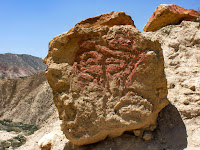Most mountain spirits are considered neutral and can either help or harm depending on the situation. These mountain spirits include Pari, a spirit that is a guardian of mountain pastures and forests. Pari are believed to be spirits that can take on different forms and help people in difficult situations. This spirit is also known for its ability to bring rain and ensure fertility. Devona is a spirit that is often associated with mountain rivers and waterfalls. This spirit is considered dangerous and can punish those who do not respect nature. Devona is also believed to be a kind of guardian of nature and protector of animals. Jinn is a spirit that can have both positive and negative properties. Jinn inhabit mountains and can help people in difficult situations, but can also harm those who do not respect nature.
There are also demonological images of mountain spirits - spirits that are considered dangerous. They possess powerful abilities and can harm humans and animals. Often their actions are perceived as a possible cause of human death. These evil mountain spirits include spirits called dev, almastys, adzhina, jondor, bala, lashkar, and ifrit. Their places of habitation are considered to be ruined houses, abandoned mountain villages, oil mills, hearths, thresholds and corners of the house, places where ash and garbage are dumped. Such places are usually called "siyahi." This is also a collective term that refers to all unclean things.
The history of the emergence of myths and legends about mountain spirits in Tajikistan is connected with ancient religious beliefs and local customs. In ancient times, many people believed that mountainous regions possessed supernatural powers and that spirits and gods dwelled within them. These beliefs were passed down from generation to generation and eventually became a part of Tajikistan's culture and traditions.
Despite modern society becoming more rational, many Tajik people still maintain faith in mountain spirits and believe that they can help in difficult situations. In some mountainous regions of Tajikistan, special rituals and ceremonies are even held that are connected to mountain spirits.
Some people approach these myths and legends skeptically, viewing them simply as stories. However, it is important to understand that for many Tajiks, these beliefs hold deep cultural significance and help to maintain a connection with their historical and cultural heritage.
Regardless of whether or not one believes in mountain spirits, it is important to respectfully approach local customs and culture. When traveling in Tajikistan, it is worth remembering that many mountainous regions are sacred places for local residents, and respect for their beliefs can help create a more harmonious atmosphere when visiting these places.









